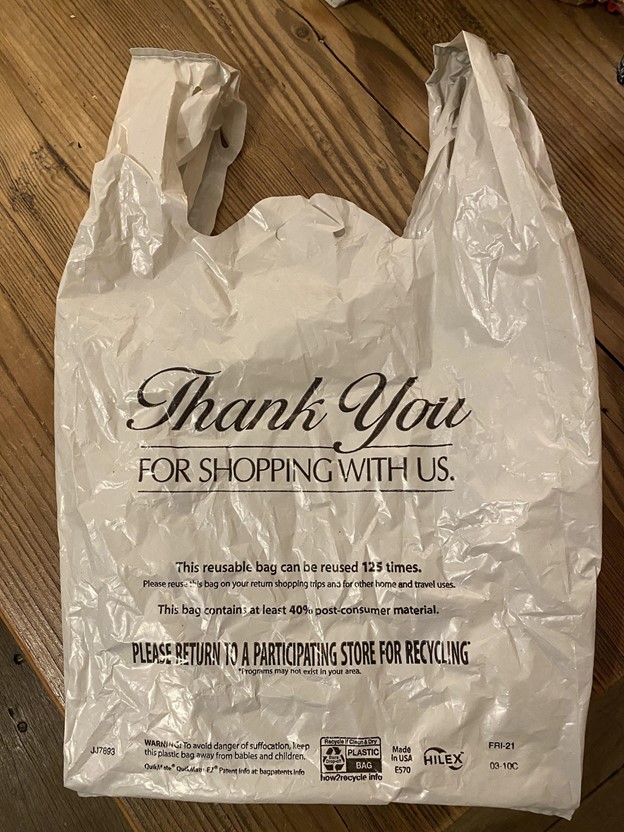
California Governor Gavin Newsom has signed a bill into law prohibiting the use of the chasing arrows symbol on material that is not able to be recycled. This symbol has led consumers to wrongfully believe that placing packaging in their curbside recycling bin ensures the next life of the material. Even when unsure about the material, hopeful consumers trust the recycling bin will bring the package to the proper pile in the end. This “wish-cycling” actually contaminates the recycling stream, making it harder to sort the materials that can actually be recycled. Removing the chasing arrows on non-recyclables will be eye opening as to how much goes straight into the landfill.
In 2016, California banned single-use plastic bags and unwittingly made way for a thicker, “reusable” plastic bag to serve at our checkout lines. While the thicker bag is meant to be reused, the length of time a plastic bag is used still averages about 12 minutes. Despite the chasing arrows symbol, we lack the proper system to recycle consumer plastic bags/film through our residential waste haulers. They are no longer accepted in most curbside recycling bins because the bags get caught in the sorting machines. This “wrench in the works” costs the recycling center time and money and the bags are eventually put directly in the landfill. Once disposed of, plastic bags will take hundreds of years to break down. Polyethylene bags don’t biodegrade, they break down into smaller and smaller toxic bits contaminating soil and waterways. Plastic is the largest source of ocean litter, killing the birds, fish, and turtles that ingest it.
Many consumers have switched to bringing reusable shopping bags and have helped to minimize the vast quantity of plastic bags produced. When bags are forgotten at home, some die-hards just load the unbagged items straight into the trunk of the car. Groceries rolling around in the car may have led to some bruised apples and extra fizzy soda, but it’s also helped reusable bags find a more permanent place in the trunk. While each plastic bag costs only about one cent for merchants, the cost of waste management and disposal can be 10-20 times more expensive. The cost of the environmental impact cannot be measured.
While many have successfully adopted the habit of bringing reusable bags to the store, there are many other plastic bags that we inadvertently bring home. Bread bags, tortilla bags, produce bags, and the plastic wrapping around toilet paper and paper towels—it only takes a few weeks of collecting these to see what a significant amount is acquired, without bringing home a single “shopping bag.” Grocery stores recycle their own plastic film used for packing and shipping, so they have the resources to handle consumer plastics as well. Cal-recycle and Waste Management direct consumers to their local grocery stores to return plastic bags/film to in-store collection bins. Prior to 2020, stores that gave out plastic bags were required to provide these collection bins for consumers to return their used bags. Since COVID, however, many stores stopped collecting and haven’t resumed.
There are still a few stores that continue to receive and recycle consumer plastic. Target has recycling bins for bottles and cans, small device electronics, and plastic bags/film. From their website: “Plastic bags and plastic film are sold to multiple vendors who recycle and reuse the material. Through our engagement and commitment with external partners, we are continuously challenging the program with a circular mindset to convert plastic bags and plastic film into products.” Sprouts Farmers Market on Ventura Blvd. also has a collection bin behind one register. Sprouts sells their plastic bags/film to the largest polyethylene recycler in North America, TREX Decking.
TREX Decking makes long-lasting, wood-like decking from 95 percent recycled materials: 50 percent of it is from plastic bags/film and 50 percent is from locally-sourced, reclaimed sawdust. Their eco-friendly manufacturing process produces a durable material that requires much less maintenance than wood and does not contribute to deforestation. The decking endures over time without warping, rotting, splintering, or cracking. Trex offers a 25 year warranty from stains and fading, although the decking should last well beyond that. This company saves more than 850 million pounds of plastic film and industrial wood scrap from ending up in landfills each year. An average, 500 square-foot composite Trex deck may contain approximately 140,000 recycled plastic bags.
Trex has contracts with Vons, Albertsons, Sprouts Farmers Market, Safeway, and Kohl’s. These stores collect their own packaging from shipping and distribution and compress it into 1000 pound blocks which Trex pays for and picks up. Trex uses clean, dry plastic bags/film that have a #2 or #4 on them or any plastic that has some stretch to it when pulled. This includes grocery store bags, bread bags, tortilla bags, produce bags, newspaper sleeves, dry cleaning plastic, bubble wrap, zip-loc bags, and plastic mailers.
The practice of collecting plastic bags/film at home quickly shows the sheer quantity that accumulates. Grocery stores can support consumers by replacing their collection bins and helping to shift our culture to one of economically and environmentally beneficial circular systems of production and consumption. There are so many aspects of our throwaway society that, once looked at, cannot be unseen. Opening our eyes is the first step to finding solutions.
Claire Chapman is an artist and a fierce eco-advocate, originally drawn to Topanga by its rich artistic and eco-conscious community. She finds purpose in living artfully and mindfully in nature while highlighting the unique issues of life in the WUI.




